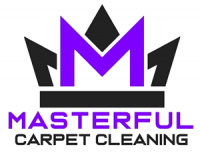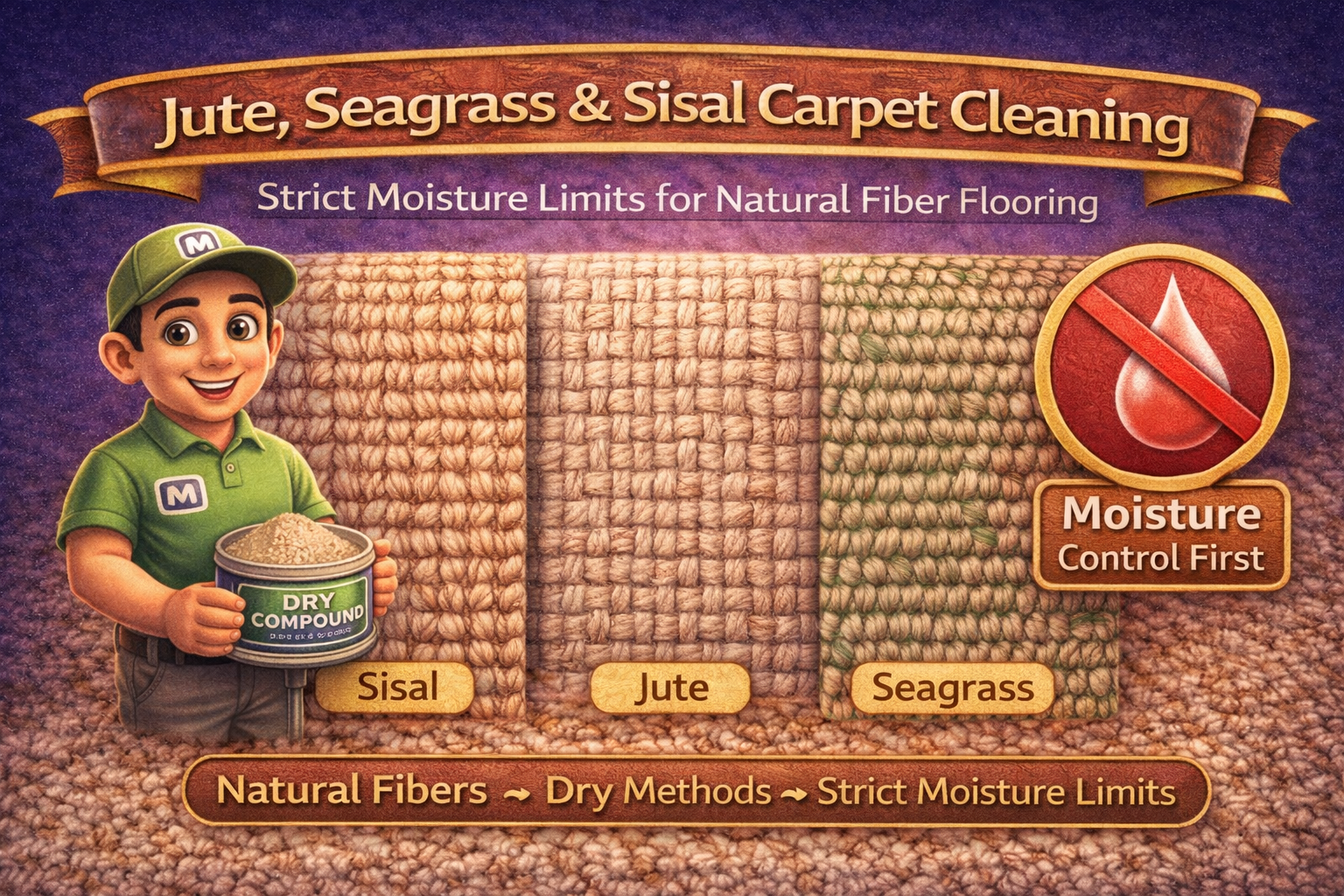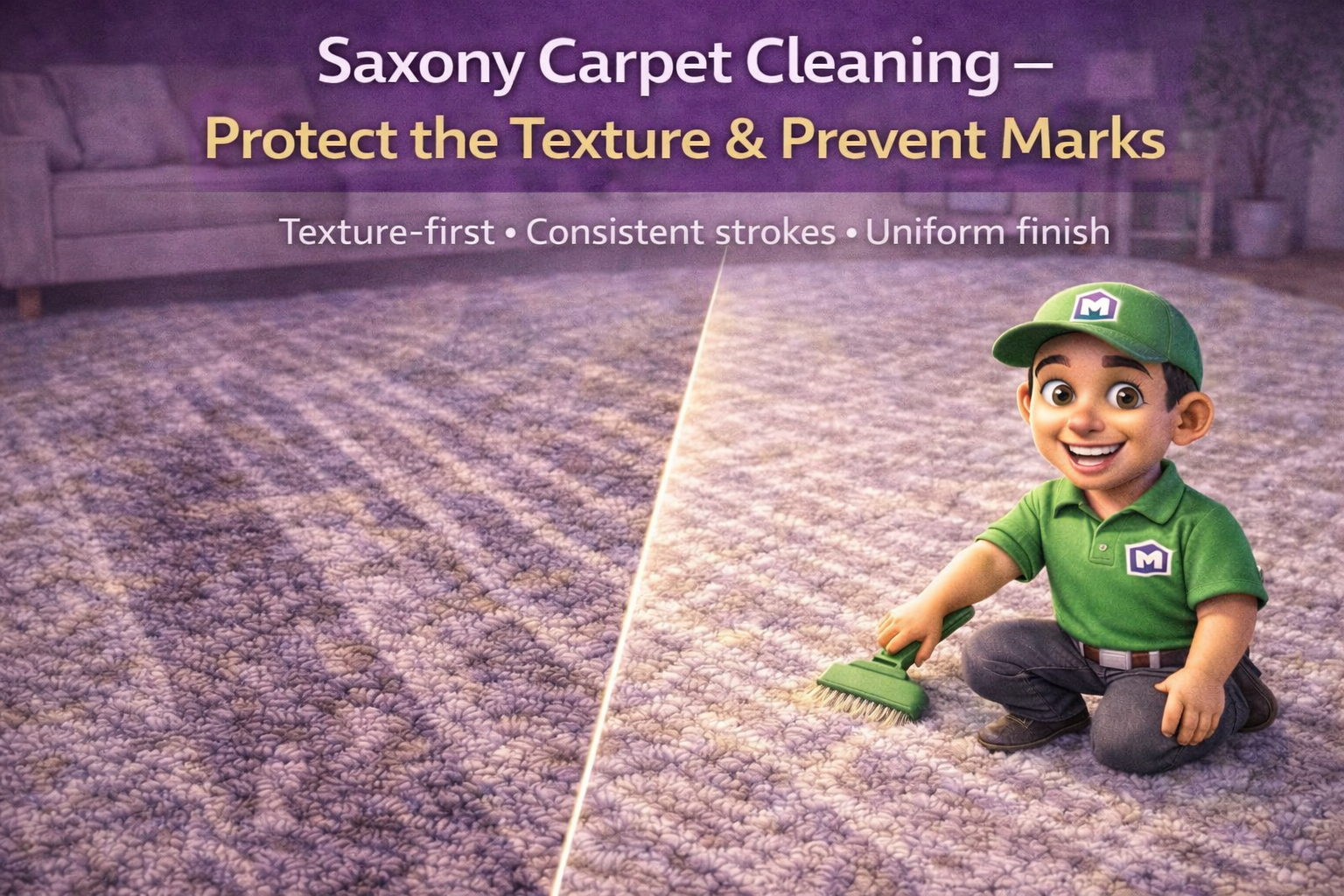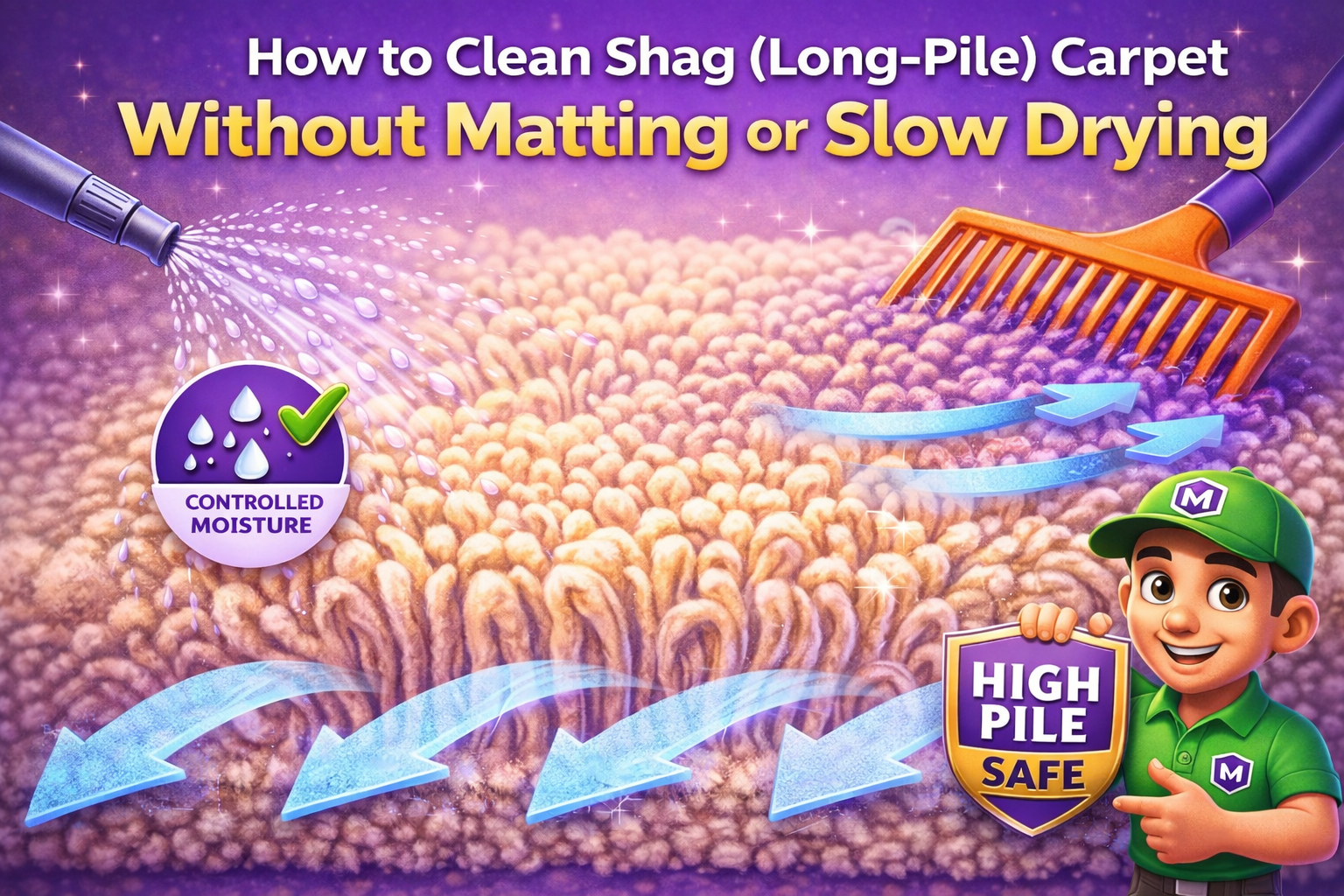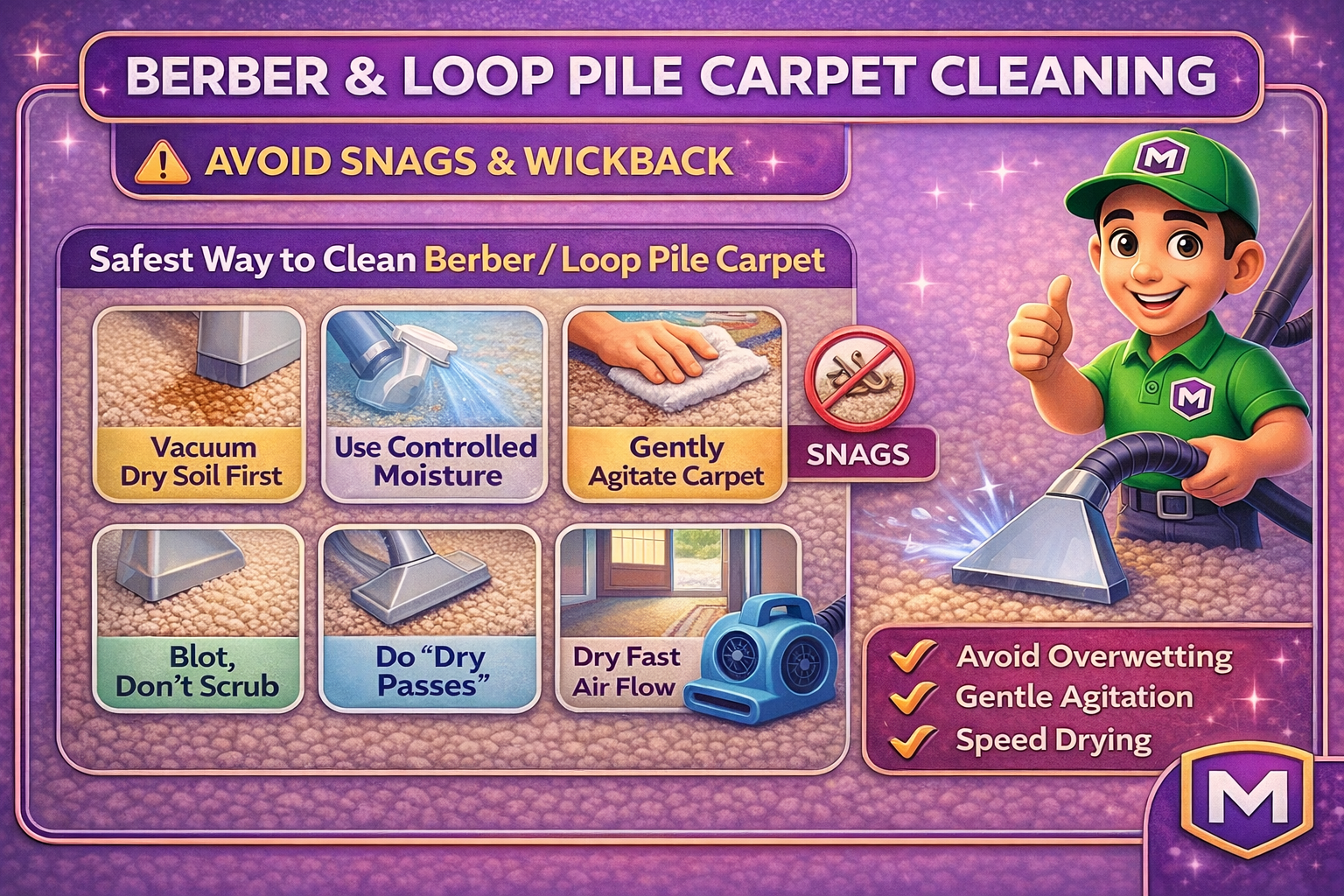Natural Cleaning Solutions for Grout: What Works and What Doesn’t (Oregon Guide)
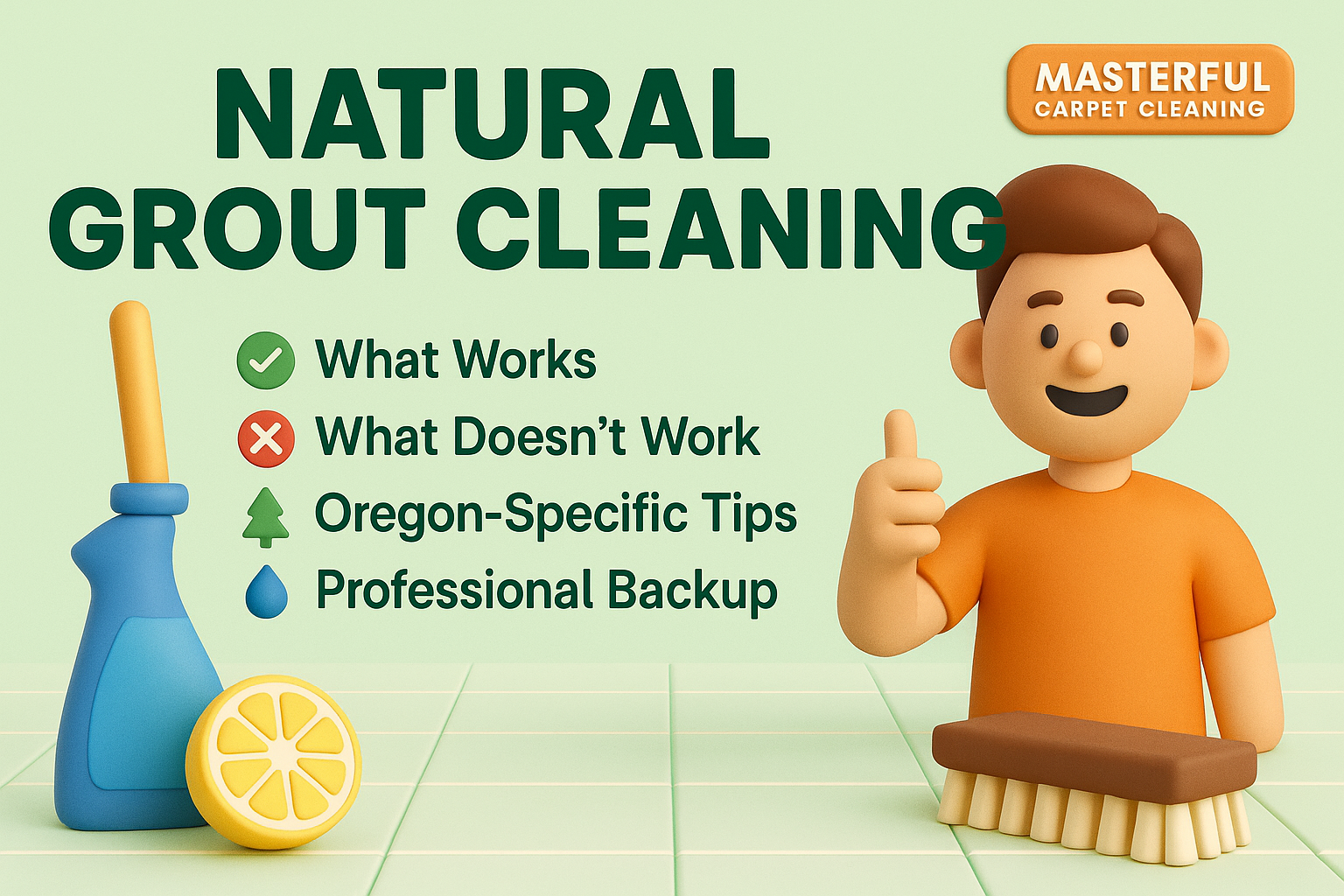
If you live in Oregon, you know how quickly grout becomes a problem. It starts small, a little discoloration in the shower or a dark line running across the kitchen tile. Before long, those once-crisp grout lines look dingy, streaked with mildew, or stained by everyday wear.
Why does this happen so often in Oregon? The answer is our climate. Between rainy seasons, damp air, and homes that trap humidity, Oregon bathrooms, kitchens, and basements create the perfect breeding ground for mold, mildew, and bacteria. Add in everyday dirt from shoes, cooking, and pets, and grout is constantly under attack.
Many homeowners turn to chemical cleaners like bleach or ammonia, hoping for a quick fix. But these products often cause more harm than good. They can weaken grout, release toxic fumes, and leave behind residues that attract dirt. Worse, they’re not safe for kids, pets, or the environment.
That’s why more Oregonians are asking: What are the best natural ways to clean grout? And which methods should I avoid?
This article breaks it down for you:
- ✅ What works: Safe, effective, eco-friendly methods backed by science and experience.
- ❌ What doesn’t work: Common myths and DIY mistakes that damage grout instead of cleaning it.
- 🌲 Oregon-specific tips: Local factors – humidity, mildew, biofilms, that make grout care unique in our state.
- 💧 Professional backup: When to call in experts for deep or restorative cleaning.
By the end, you’ll know exactly how to protect your grout naturally and when to lean on professionals like Masterful Carpet Cleaning’s grout service to handle the toughest jobs.
Read more: The Importance of Grout Cleaning in Tile Floor Maintenance →
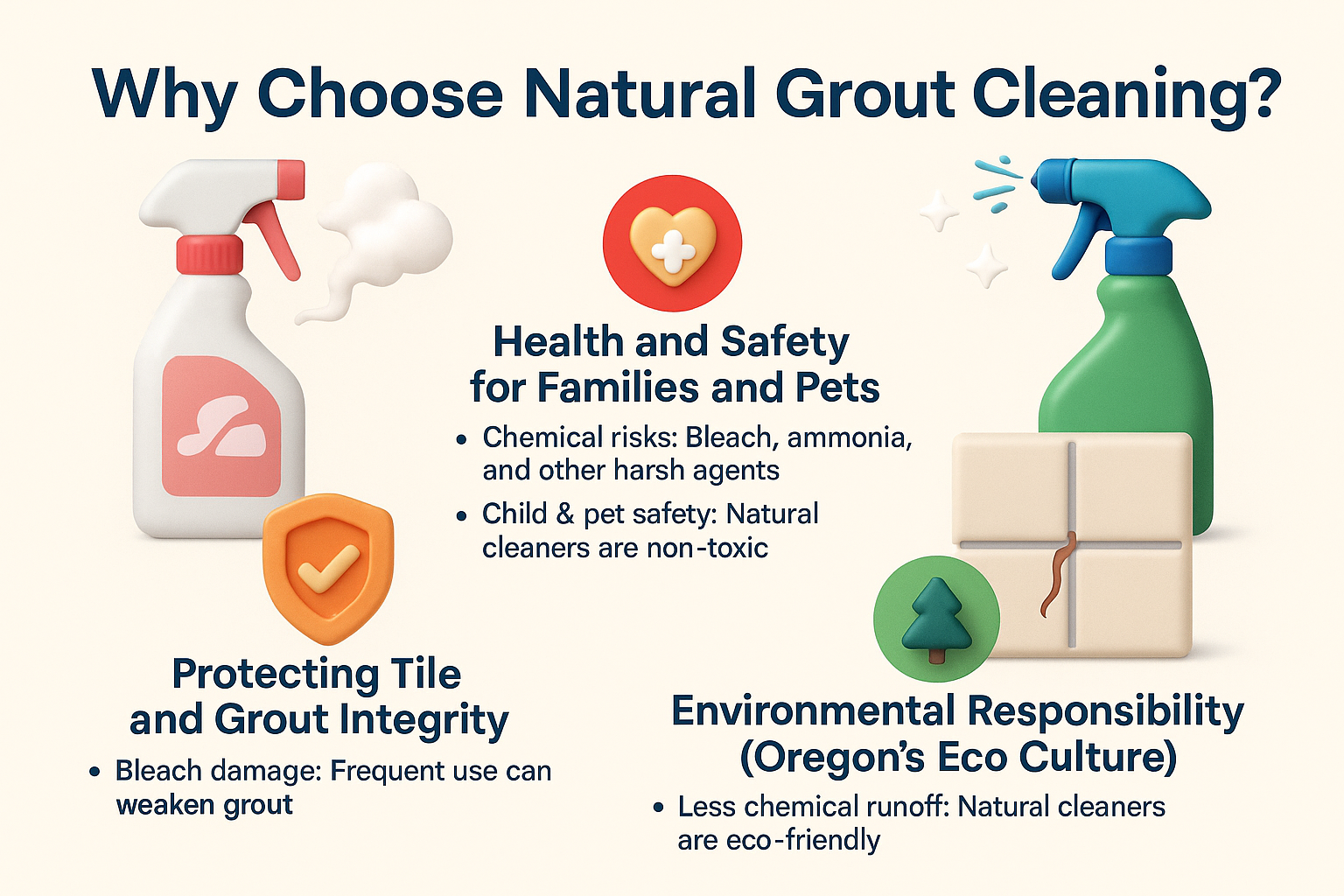
Why Choose Natural Grout Cleaning?
When it comes to grout cleaning, not all methods are created equal. Sure, bleach may seem powerful, and store-bought sprays promise instant results, but these quick fixes often mask the problem instead of solving it. Over time, they erode grout, discolor surfaces, and make stains harder to remove.
Natural grout cleaning isn’t just a “green” trend. It’s a smarter, safer, and often more effective way to care for tile surfaces. Let’s look at why eco-friendly methods are especially valuable for Oregon homeowners.
Health and Safety for Families and Pets
- Chemical risks: Bleach, ammonia, and other harsh agents can irritate eyes, skin, and lungs. In poorly ventilated Oregon bathrooms, fumes linger and become a genuine health risk.
- Child & pet safety: Curious kids and pets can easily come into contact with cleaning residues. Natural cleaners like baking soda or vinegar, when used properly, are non-toxic and far safer for daily use.
- Allergy-friendly: Natural solutions minimize chemical exposure, reducing irritation for people with asthma or allergies.
Protecting Tile and Grout Integrity
Grout is porous; it absorbs liquids and reacts to chemicals. Overuse of harsh cleaners doesn’t just strip away stains; it also weakens grout and shortens its lifespan.
- Bleach damage: Frequent bleach use causes grout to crack, chip, or crumble.
- Color fading: Colored grout can lose vibrancy or develop uneven tones after exposure to strong chemicals.
- Stone sensitivity: Natural stones like marble, travertine, or granite are particularly vulnerable. Acids such as vinegar or lemon juice can permanently etch the surface.
By contrast, natural solutions like baking soda and hydrogen peroxide clean effectively without degrading the grout or damaging nearby tile.
Environmental Responsibility (Oregon’s Eco Culture)
Oregon is known for sustainability, our residents care deeply about reducing waste and avoiding harmful chemicals. Using eco-friendly cleaners aligns with this lifestyle.
- Less chemical runoff: Unlike bleach or ammonia, natural cleaners don’t release toxic residues into wastewater.
- Sustainable ingredients: Baking soda, vinegar, and lemon juice are biodegradable and safe for the environment.
- Aligns with eco-conscious living: More and more Oregon households are seeking natural cleaning alternatives as part of a greener lifestyle.
Discover Eco-Friendly Cleaning Solutions →
Mold and Mildew Prevention in Oregon’s Climate
One of the biggest grout problems in Oregon is mildew growth caused by humidity. Bathrooms, basements, and kitchens often trap damp air, creating ideal conditions for fungal growth.
Natural cleaners play a critical role here:
- Vinegar (on ceramic surfaces) helps kill mildew spores.
- Hydrogen peroxide is excellent at tackling mold stains without the toxicity of bleach.
- Essential oils like tea tree oil have natural antifungal properties that leave grout smelling fresh while discouraging mold regrowth.
Preventing mildew is not just about cleaning, it’s about protecting your home from long-term damage and health issues associated with mold exposure.
Saving Money While Staying Effective
Another overlooked benefit? Cost savings.
- Natural cleaners like baking soda, vinegar, and hydrogen peroxide are inexpensive and widely available.
- They can be repurposed for dozens of other household uses – laundry, surface cleaning, deodorizing, making them budget-friendly essentials.
For Oregon families focused on both sustainability and cost-conscious living, natural grout cleaning is a win-win.
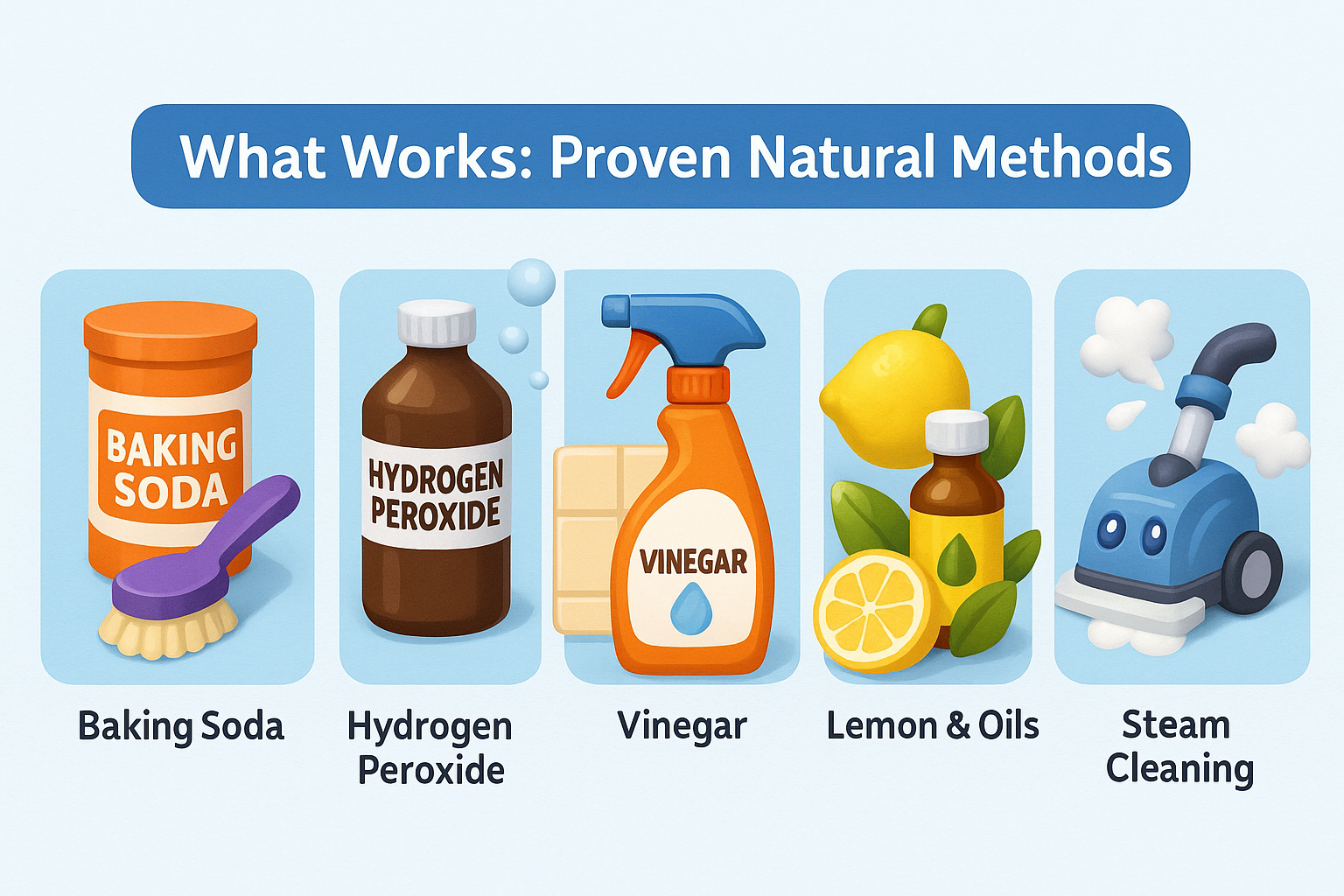
What Works: Proven Natural Cleaning Solutions
Not every DIY recipe floating around online delivers results. But the following natural cleaning methods are time-tested, effective, and safe when used correctly. Each one tackles specific problems, from light surface dirt to stubborn mildew stains, making them the go-to choices for Oregon homeowners.
Baking Soda Paste (The Gentle Scrubber)
Why it works: Baking soda is mildly abrasive. It scrubs away dirt without scratching grout or tile. It also neutralizes odors and lifts light stains.
How to use it:
- Mix 3 parts baking soda with 1 part water to form a paste.
- Apply paste directly onto grout lines.
- Let sit for 5–10 minutes.
- Scrub gently with a soft toothbrush or nylon bristle brush.
- Rinse with warm water.
👉 Best for: Light dirt, discoloration, and routine maintenance.
Hydrogen Peroxide (Stain Fighter & Mildew Buster)
Why it works: Hydrogen peroxide (3%) has natural bleaching and antimicrobial properties. It lifts deep stains and helps disinfect grout without the harshness of chlorine bleach.
How to use it:
- Apply hydrogen peroxide directly to grout lines.
- For stubborn stains, mix baking soda + hydrogen peroxide into a paste.
- Scrub lightly and let sit for 10 minutes before rinsing.
👉 Best for: Oregon bathrooms prone to mildew, soap scum, and stubborn stains.
Vinegar (Ceramic Tile Only)
Why it works: Vinegar is a mild acid that dissolves mineral deposits, soap scum, and mildew. It’s only safe for ceramic or porcelain tile grout, not natural stone.
How to use it:
- Mix equal parts distilled white vinegar and warm water in a spray bottle.
- Spray directly on grout lines.
- Let sit for 5 minutes.
- Scrub with a soft brush.
- Rinse thoroughly to prevent acidic residue.
⚠️ Warning: Never use vinegar on marble, travertine, limestone, or granite, it etches the stone and leaves permanent damage.
👉 Best for: Everyday buildup on ceramic and porcelain tile grout.
Lemon Juice & Essential Oils (Fresh & Fragrant)
Why it works: Lemon juice is another mild acid, effective on light stains. Essential oils like tea tree, lavender, or lemon oil add natural antimicrobial and deodorizing properties.
How to use it:
- Combine lemon juice with baking soda for a gentle scrub.
- Add a few drops of tea tree oil to water for a natural mildew spray.
- Apply, scrub, rinse, and dry.
👉 Best for: Kitchen grout with food stains or areas where odor control is needed.
Steam Cleaning (Heat-Driven Power)
Why it works: Steam loosens dirt, dissolves grime, and kills mildew spores, all without chemicals. It’s one of the most eco-friendly methods, provided the grout is sealed.
How to use it:
- Use a handheld steam cleaner with a grout brush attachment.
- Run steam along grout lines slowly.
- Wipe clean with a microfiber cloth.
⚠️ Warning: Do not use on unsealed grout, as excess moisture may seep in.
👉 Best for: Households seeking a chemical-free deep clean.
Quick Tip Table: What Works Best Where
| Method | Best For | Avoid On |
|---|---|---|
| Baking Soda Paste | Light dirt, odor | N/A |
| Hydrogen Peroxide | Mold, mildew, stains | Colored grout (may fade) |
| Vinegar | Ceramic & porcelain tile grout | Natural stone |
| Lemon Juice & Oils | Kitchen stains, odors | Stone surfaces |
| Steam Cleaning | Eco deep clean | Unsealed grout |
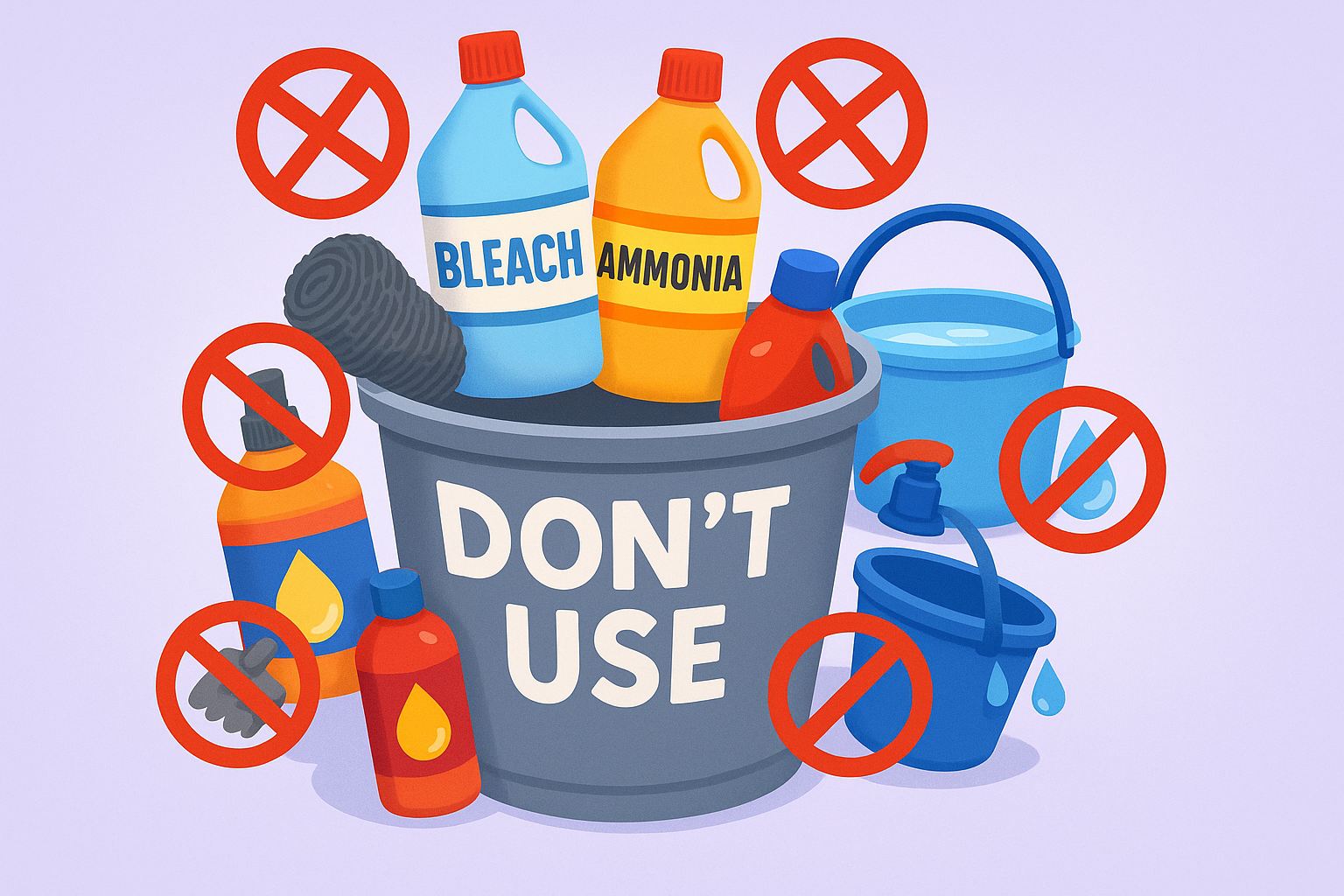
What Doesn’t Work: Common Mistakes & Myths
It’s just as important to know what not to use. Many popular hacks can damage grout, shorten its lifespan, or create safety hazards. Let’s separate fact from fiction.
❌ Bleach (Harsh & Damaging)
- Bleach weakens grout structure with repeated use.
- It often turns white grout yellow over time.
- Chlorine fumes irritate lungs, especially in Oregon bathrooms with poor ventilation.
❌ Ammonia (Toxic Fumes, Bad for Grout)
- Ammonia discolors grout.
- It’s highly toxic if inhaled.
- Mixing with bleach creates deadly chlorine gas.
❌ Vinegar on Natural Stone (Permanent Damage)
- Acid in vinegar etches stone surfaces like marble, travertine, limestone, or granite.
- Leaves dull spots, rough patches, and permanent etching.
❌ Overuse of Water (Weakens Grout)
- Grout is porous – soaking it with water weakens the bond.
- Excess moisture promotes mold growth in Oregon’s humid climate.
❌ Harsh Scrubbers (Scratch & Destroy)
- Tools like steel wool or wire brushes scratch grout and tile.
- Scratches trap dirt, making grout harder to clean long-term.
❌ Colored Cleaners & Residues (Staining Risk)
- Dyes in some cleaners stain grout lines.
- Soap- or wax-based products leave sticky films that trap dirt.
❌ Mixing Chemicals (Dangerous Reactions)
- Bleach + ammonia = toxic chlorine gas.
- Even “natural” and chemical mixes can neutralize each other or create harmful residues.
📌 At-a-Glance: What to Avoid
- Never use: Bleach, ammonia, steel wool, vinegar on stone, chemical mixtures.
- Be cautious with: Excess water, soap-based cleaners, colored products.
Learn More: Chemical Cleaners for Grout →
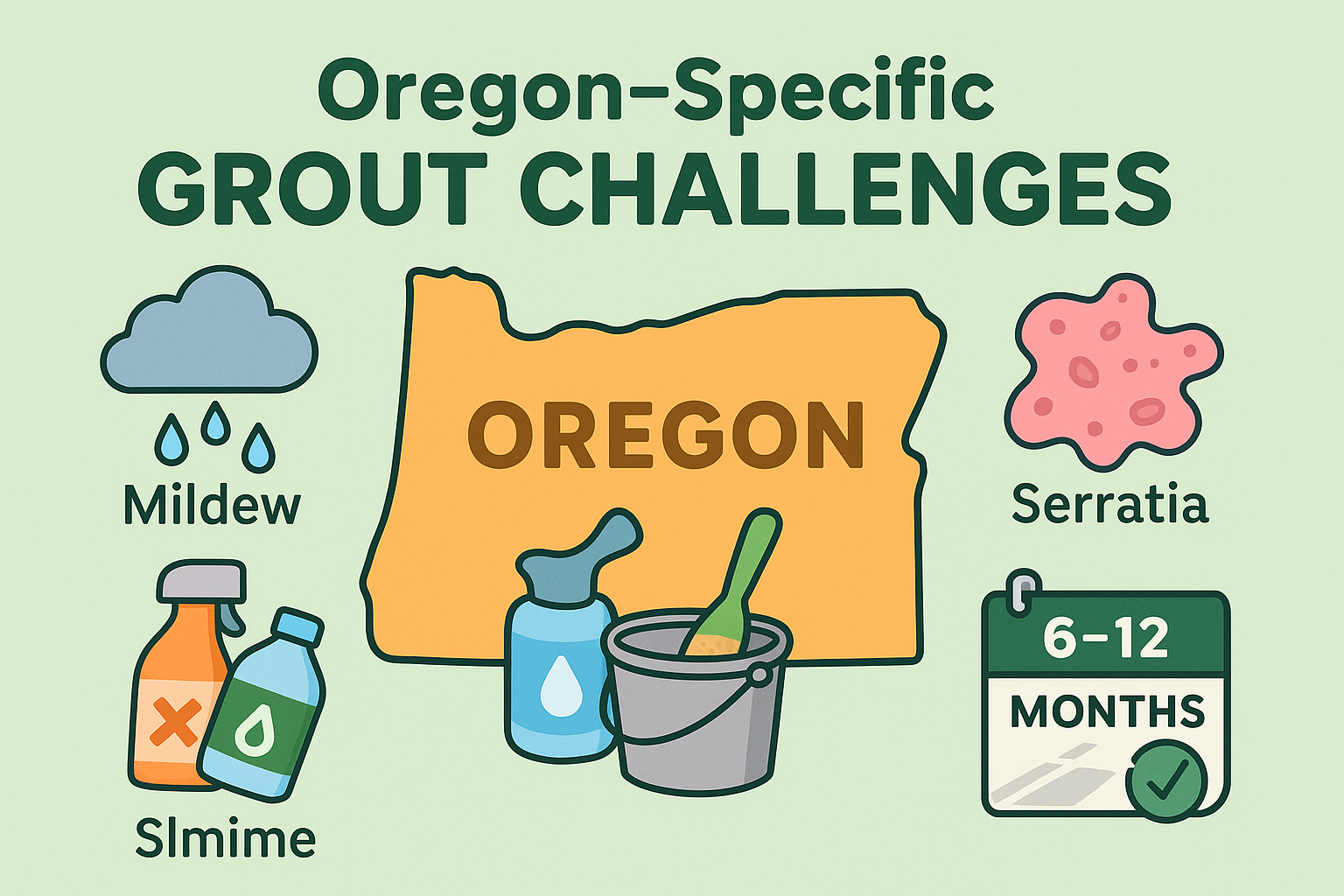
Oregon-Specific Grout Cleaning Challenges
Grout cleaning in Oregon isn’t quite the same as it is in Arizona, Colorado, or Florida. Our unique Pacific Northwest climate brings its own set of issues that make grout maintenance more challenging, and more important.
High Humidity = Mildew Growth
Oregon is known for rain, damp basements, and humid bathrooms. This excess moisture settles into grout lines, creating the perfect breeding ground for mold and mildew. Even freshly cleaned grout can show dark spots within weeks if it’s not sealed or dried properly.
Prevention tips:
- Keep bathrooms ventilated with fans or open windows.
- Dry grout lines with a microfiber cloth after showers.
- Use a dehumidifier in damp basements.
Biofilms & Red Stains (The Oregon Bathroom Problem)
If you’ve noticed pink or red discoloration in shower grout, you’re not alone. Oregon homeowners often battle a bacterial biofilm caused by Serratia marcescens.
- Appears as reddish-pink slime in grout lines.
- Thrives in humid bathrooms.
- Regular cleaning with hydrogen peroxide or a vinegar spray (ceramic only) keeps it under control.
Sealing & Resealing Is Critical
Because of our moisture-heavy environment, grout in Oregon should be sealed more frequently than in drier climates.
- Recommendation: Reseal every 6–12 months, especially in bathrooms.
- Sealing prevents moisture from penetrating porous grout.
- Without sealing, even natural cleaning methods won’t prevent long-term staining.
Oregon’s Eco-Conscious Homeowners
Another factor unique to our region is culture: Oregonians tend to prefer eco-friendly, non-toxic cleaning solutions. While bleach-based products dominate in other states, here the demand is for safe, sustainable methods.
- Natural cleaners fit perfectly with Oregon values.
- Essential oils, castile soap, and steam cleaning are increasingly popular.
- Masterful Carpet Cleaning offers green-certified cleaning services to match this demand.
Learn More: Grout Cleaning for Natural Stone Tiles →

When to Call Professionals
DIY natural cleaning methods go a long way, but sometimes grout problems are too severe for baking soda and vinegar to handle. Knowing when to bring in professional help can save you time, frustration, and even the cost of re-grouting or tile replacement.
Signs You Need Professional Grout Cleaning
- Deep Stains Won’t Lift Even after repeated scrubbing with natural cleaners, stains remain dark or black.
- Persistent Mold & Mildew When mold keeps coming back within days, even after thorough cleaning, it may be rooted deeper inside the grout.
- Crumbling or Cracked Grout If grout is flaking or breaking, it needs restoration, not just surface cleaning.
- Discolored Natural Stone Marble, travertine, or granite around grout lines require professional, stone-safe cleaning.
Benefits of Professional Grout Cleaning
Hiring professionals like Masterful Carpet Cleaning brings several advantages:
- Eco-Friendly Methods We use green-certified solutions that are safe for families, pets, and Oregon’s environment.
- Deep Cleaning Equipment Our tools penetrate deeper into grout pores than any DIY brush or paste.
- Grout Sealing & Protection After cleaning, we can seal or reseal grout lines, protecting them from future stains and moisture damage.
- Long-Term Results A single professional cleaning extends grout life and keeps tile looking new.
Why Choose Masterful Carpet Cleaning (Oregon)
As a locally trusted company, we understand both the climate challenges and the eco values of Oregon homeowners.
- Serving Portland, Salem, Eugene, Albany, and nearby towns.
- Specializing in eco-friendly tile and grout cleaning.
- Offering full-service sealing, restoration, and maintenance.
- Known for reliable service and long-lasting results.
👉 Book your professional grout cleaning service today →
When Cleaning Isn’t Enough (Repair vs Replace)
Sometimes grout damage goes beyond cleaning. If you notice:
- Missing sections of grout.
- Cracks that run along entire tile edges.
- Loose or shifting tiles.
…it may be time for re-grouting or tile replacement. Professionals can evaluate whether restoration is possible or if replacement is the safer option.
FAQs
We get a lot of questions from Oregon homeowners about grout cleaning. Here are some of the most common, with clear, practical answers.
Can vinegar ruin grout? Vinegar is safe for ceramic and porcelain tile grout but should never be used on natural stone surfaces like marble, travertine, granite, or limestone. On stone, vinegar’s acidity causes etching and permanent dull spots. If you’re unsure about your tile type, avoid vinegar and opt for baking soda or hydrogen peroxide instead.
What’s the best natural grout cleaner? For most stains, the best all-around natural cleaner is a baking soda and hydrogen peroxide paste. Baking soda scrubs safely, while hydrogen peroxide lifts deep stains and kills mildew. Together, they’re safe, eco-friendly, and highly effective.
How often should grout be sealed in Oregon? In Oregon’s damp climate, grout should be sealed every 6-12 months. Bathrooms and kitchens with heavy moisture may need resealing more often. Sealing prevents water absorption, mold growth, and staining.
Is steam cleaning safe for grout? Steam cleaning is safe and effective for sealed grout. It uses high heat to loosen dirt and kill mildew spores without chemicals. Avoid steam cleaning unsealed grout, as moisture can seep inside and cause damage.
How do I prevent grout mold in my bathroom?
- Ventilate with fans or open windows during and after showers.
- Wipe grout lines dry with a microfiber cloth.
- Use hydrogen peroxide spray weekly to discourage mildew.
- Reseal grout regularly to block moisture penetration.
What natural cleaners should I never mix? Never mix bleach and ammonia, together, they produce toxic chlorine gas. Even mixing vinegar with hydrogen peroxide creates peracetic acid, which can irritate lungs. Stick to one method at a time for safety.
Read more: Cleaning Unsanded Grout →
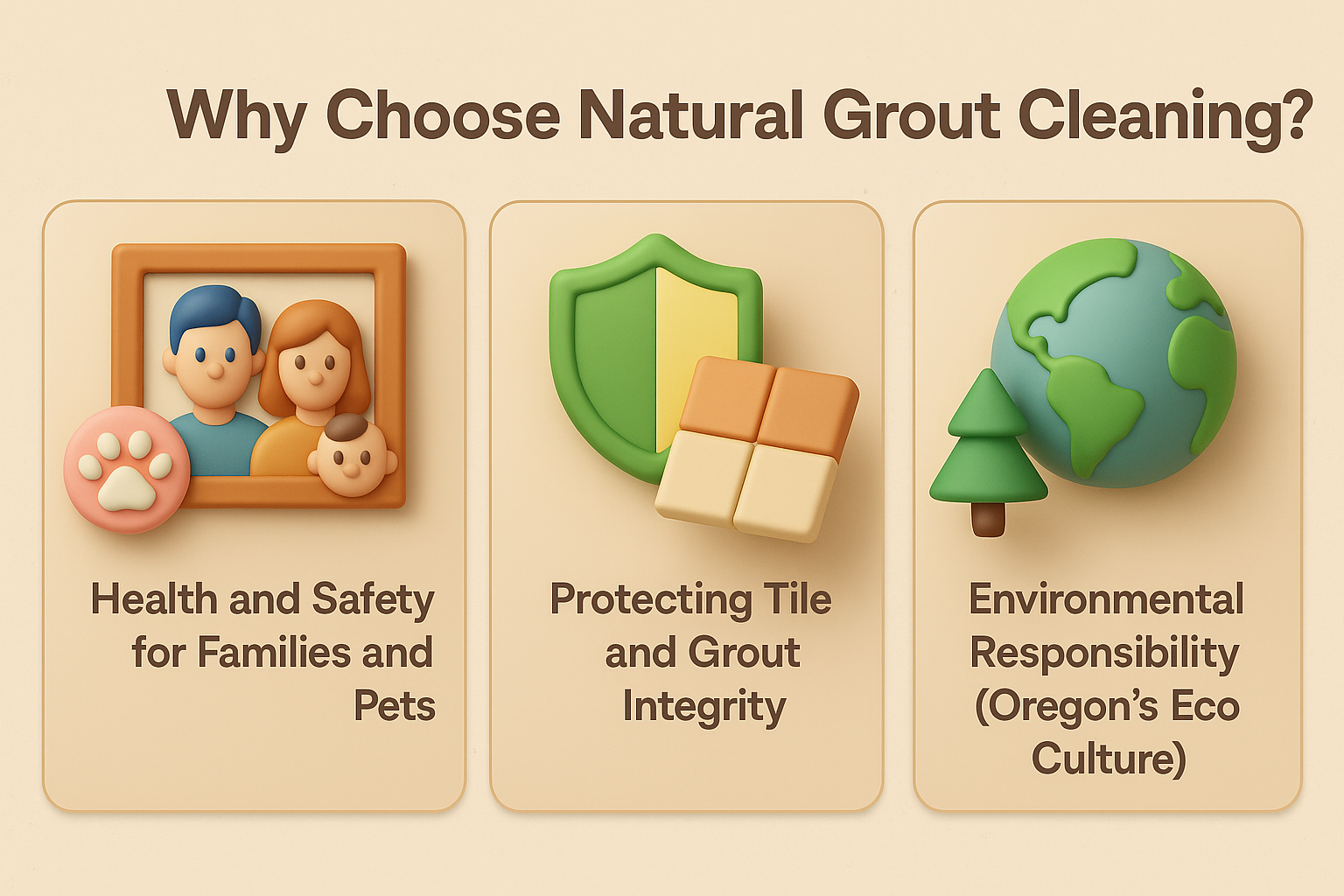
The Smart Way to Keep Grout Clean in Oregon
Grout cleaning doesn’t have to mean harsh chemicals and toxic fumes. With the right natural solutions, you can keep your grout looking bright and healthy, while protecting your family, your home, and the Oregon environment.
✅ What Works:
- Baking soda paste for safe scrubbing.
- Hydrogen peroxide for tough stains and mildew.
- Vinegar (on ceramic/porcelain only) for mineral buildup.
- Lemon juice and essential oils for freshness and light disinfecting.
- Steam cleaning for a chemical-free deep clean.
❌ What Doesn’t Work:
- Bleach and ammonia (toxic, damaging).
- Vinegar on natural stone (etching).
- Overuse of water (weakens grout).
- Harsh scrubbers and colored cleaners (scratching and staining).
- Mixing chemicals (dangerous reactions).
🌲 Oregon-Specific Tips:
- Ventilate bathrooms to fight humidity-driven mildew.
- Treat red/pink biofilms with hydrogen peroxide.
- Seal grout every 6–12 months to protect against constant moisture.
- Use eco-friendly cleaners that align with Oregon’s sustainability values.
And when DIY methods aren’t enough? That’s where we come in.
At Masterful Carpet Cleaning, we specialize in eco-friendly tile and grout cleaning across Oregon. Our professional services go deeper than DIY methods, with advanced tools, green-certified solutions, and expert sealing to protect your home long-term.
When you’re in Portland, Salem, Eugene, or anywhere in between, we’re here to help you keep your grout clean, healthy, and lasting for years to come.
👉 Book your professional grout cleaning service today →
As the Co-Owner of Masterful, Randy has been providing quality cleaning services to the Salem and Portland areas of Oregon for many years. He has built a reputation for excellence in the industry. His team take prides in using the latest cleaning techniques and technologies to deliver exceptional results every time.Author

